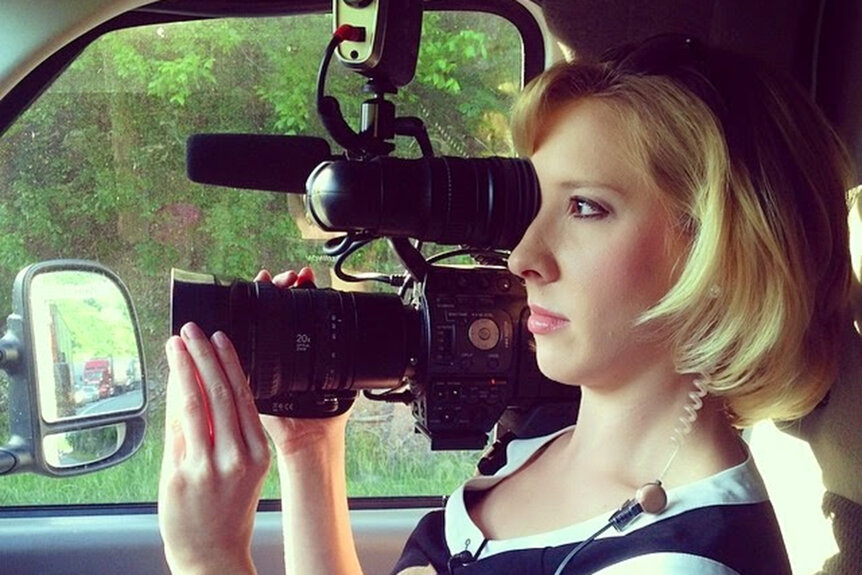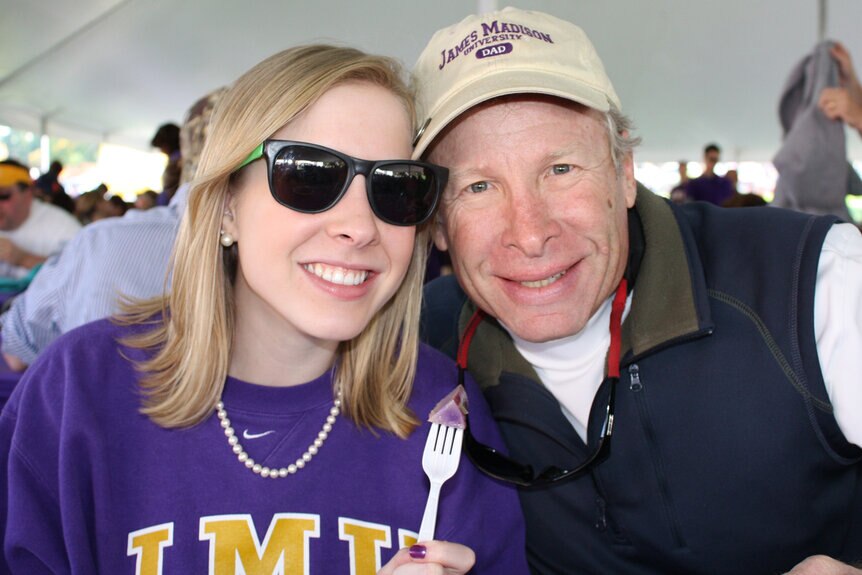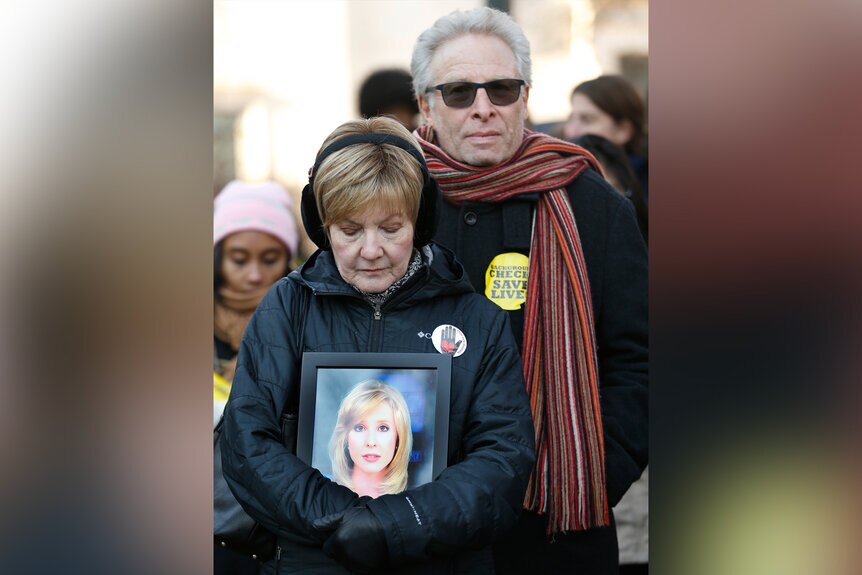Create a free profile to get unlimited access to exclusive videos, breaking news, sweepstakes, and more!
Dad Turns Video Of Daughter’s Televised Killing Into NFT To Force Its Removal On Social Media
Andy Parker, the father of slain WDBJ reporter Alison Parker, accuses Facebook, Instagram and YouTube of profiting off pirated versions of the video of her murder.

The family of a Virginia reporter who was fatally shot on live television in 2015 has turned one of the viral, often-pirated clips of her death into a NFT, or non-fungible token, in a “long shot” bid to wipe it from the web.
For nearly seven years, Andy Parker, the father of slain journalist Alison Parker, has fought without full success to completely expunge the videos depicting his daughter’s death from social media.
In December, Parker created an NFT of the clip that originally aired on live television on Rarible — a digital cryptocurrency marketplace — in an attempt to claim copyright ownership over the recording, which he hopes would give him the ability to sue social media companies like Facebook, Instagram and YouTube when he finds pirated versions.
An NFT is a non-exchangeable asset — a designation applicable to both virtual and physical goods ranging from social media content, online music and art — which are logged on a public block chain. The process, which is similar in nature to how cryptocurrency transactions work, dictates all possible sales and any trading of such assets.
“We’re in uncharted territory,” Parker told Oxygen.com. “We don’t know if it’s going to work or not.”
Parker described his bid as a “long shot,” “Hail Mary” attempt to force the social media companies to be more proactive in removing copies of the clip.
“These platforms profit from Alison’s murder,” he insisted.
“It’s throwing spaghetti on the walls to see what sticks,” Parker said. “And hopefully this will stick. But if you don’t try — if you don’t at least make the attempt — you’ll never know and so that’s why we’re doing what we’re doing.”
Parker and his legal team are hoping that the creation of the NFT could possibly set a new precedent and provide a new avenue for everyday users to enforce copyright infringements against content disseminated on social media platforms.
“Regardless if it works, we created something brand new: Not just the NFT, but a means to fight Google and Facebook,” he explained. “And if it doesn’t, at least it brings attention to what’s going on here.”
Carrie Goldberg, a Brooklyn-based lawyer who specializes in online abuse cases and consulted Parker, echoed her client's claims that he has a shot at claiming copyright via the NFT.
"The situation calls for an extreme and creative approach," Goldberg told Oxygen.com. "This girl’s murder image is completely out of control of the family."
"I think Andy has to be as experimental as possible," Goldberg added. "Andy is being an innovator here so let’s see if the NFT does enable him to take back control of Alison’s image and legacy."
On Aug. 26, 2015, Alison Parker and videographer Adam Ward were gunned down as she conducted a live interview with a member of a local chamber of commerce near Moneta, Virginia. Vester Lee Flanagan II, a disgruntled former station employee, was later identified as the shooter; Flanagan also took video of himself conducting the shooting and briefly made it available on his Twitter and Facebook accounts before the platforms suspended him.
Flanagan had been a reporter at WDBJ who went by the professional name Bryce Williams, and was known by colleagues for his unhinged and confrontational behavior. He was fired in 2013, and he reportedly refused to leave the station until police were called to escort him out.
After an attempt to pull Flanagan over, he fatally shot himself while fleeing from police on Interstate 66.
Long after his, Parker, and Ward’s deaths, however, both of the unsettling clips of the deadly shooting were still being widely shared online on social media.
Parker’s father filed complaints with the Federal Trade Commission against YouTube and Facebook in 2020 and 2021, respectively, urging federal regulators to intervene after the companies failed to remove all videos of his daughter’s killing.
“The reality is that Facebook and Instagram put the onus on victims and their families to do the policing of graphic content — requiring them to relive their worst moments over and over to curb the proliferation of these videos,” the complaint, obtained by Oxygen.com, stated.
Parker, who has never watched the newscast depicting his daughter’s final living moments, accused Facebook and Instagram of failing to properly review graphic and offensive content flagged by users on its platforms in a timely manner, which he contends has contributed to the rapid spread of videos of his daughter's murder.
“Volunteers who spend significant time monitoring social media platforms for violative content often must wait weeks after reporting content before any response from the platform; even after these efforts, videos often remain on the site,” the complaint added.
Facebook, however, has insisted it has attempted to remove the videos of Parker’s murder from Facebook, but that users keep deliberately re-adding the clips.
“These videos violate our policies and we are continuing to remove them from the platform as we have been doing since this disturbing incident first occurred,” a spokesperson for Meta, Facebook's parent company, said in a statement sent to Oxygen.com. “We are also continuing to proactively detect and remove visually similar videos when they are uploaded.”
Gray Television, the parent company of WJBT, holds the original copyright to the live television footage of Parker’s murder. Her father says that the station has declined to cede co-ownership of the clip to her family, her father said.
“If we got the co-copy right we could sue Facebook and Google for violating copyright but Gray won’t do it,” Parker explained. “We don’t know why and they refuse to talk to us. We’ve been trying to get Gray to do the right and decent thing for two years and they not only will refuse, they won’t tell us why. You would think that we at least would deserve an answer.”
Gray Television denied Parker's allegations and said said it had previously offered the Parker family a license via the HONR Network. The network, established by Sandy Hook parent Lenny Pozner, is a non-profit group that advocates for families of crime victims against online harassment and abuse.
“Gray provided the HONR Network a license years ago so that it could do what Mr. Parker claimed to seek – flagging for removal any use of our copyrighted video for non-news purposes,” Kevin Latek, executive vice president of Gray Television, told Oxygen.com in a statement. “Rather than work through the HONR Network to effectuate needed take-downs, Mr. Parker invented the false narrative that Gray Television somehow profits from the unauthorized distribution of its content, which is patently untrue.”
The broadcaster also cast doubt on the family’s current quest to sue social media giants by creating an NFT.
“As to the issue of the NFT, Gray has never been asked for permission to create an NFT using our copyrighted content,” Latek added. “While we have provided usage licenses to third parties, those usage licenses do not and never have allowed them to turn our content into NFTs and, in any event, Gray has never entered into a usage or any other copyright license agreement with Mr. Parker.”
However, even if Parker's creation of the NFT using their copyrighted content is successful, Gray noted to the New York Post that it wouldn't stop the proliferation of the killer's own, separate video
In the years since his daughter’s murder, Parker has waded into politics in his quest to have all online videos of her murder taken down. The retired Virginia executive banking recruiter has become a gun control advocate and testified against Facebook and YouTube before the Senate Judiciary Committee. In January, he launched a congressional campaign — largely in his daughter’s memory — in which he vowed to take on big tech.
“The issue is not a Democrat or Republican issue,” he added. “It’s an American issue. If we don’t fix social media we’re going to be in a world of hurt. And I think we already are. It’s going to tear this country apart.”
Parker, a Democrat, is attempting to unseat Republican incumbent Bob Good in Virginia’s traditionally conservative 5th Congressional District. The last time his district — the largest in the state — swung blue was in 2008 when Rep. Tom Perriello narrowly defeated six-term Republican incumbent, Virgil Goode Jr.
Nonetheless, the aspiring lawmaker called the approaching midterm showdown a “winnable race” and a “fight worth fighting.”
“When our kids were growing up, we taught them, we instilled in them, you need to make a difference in the world,” Parker said. “And Allison certainly did.”
Parker described his late daughter as a “promising,” “accomplished” and “incredibly talented” television reporter who was “beautiful on the inside as she was on the outside.”
“She was a kind soul, a great friend and mentor, and she touched so many lives,” Parker said. “And still does to this day. She had a life of promise, and left a legacy of change for the better.”
“Had I not taken this on, then I would not be faithful to what we taught her,” Parker added. “And that is: I’m trying to make a difference. It’s a fight worth fighting, as long as it takes. This is my job. This is what Alison would expect me to do. She would expect nothing less than me continuing this and trying to do right not just for her, but others.”

























